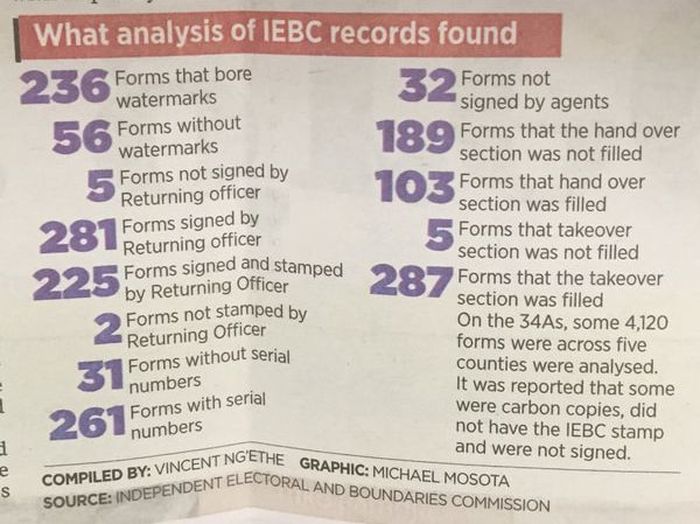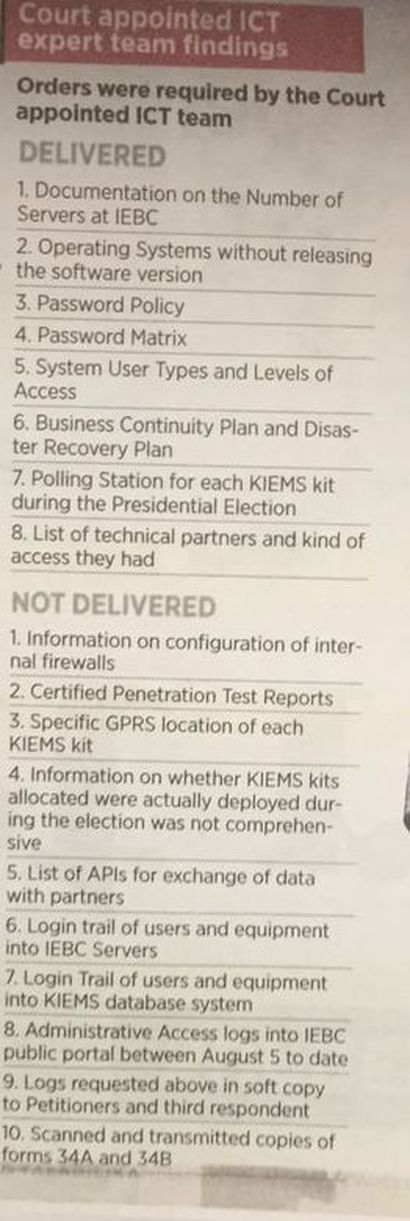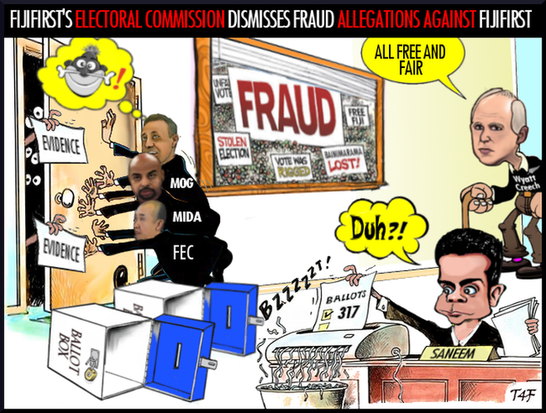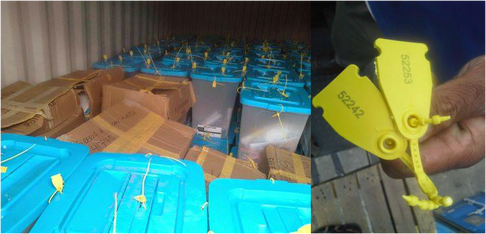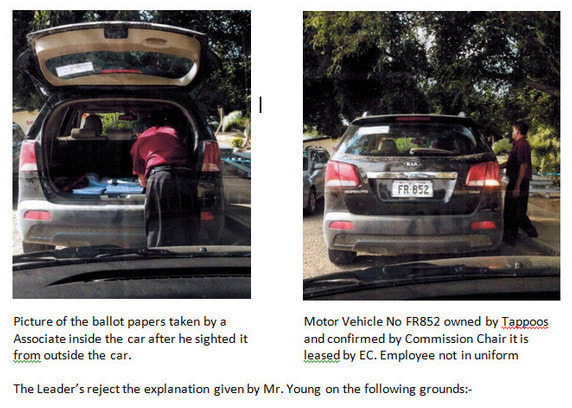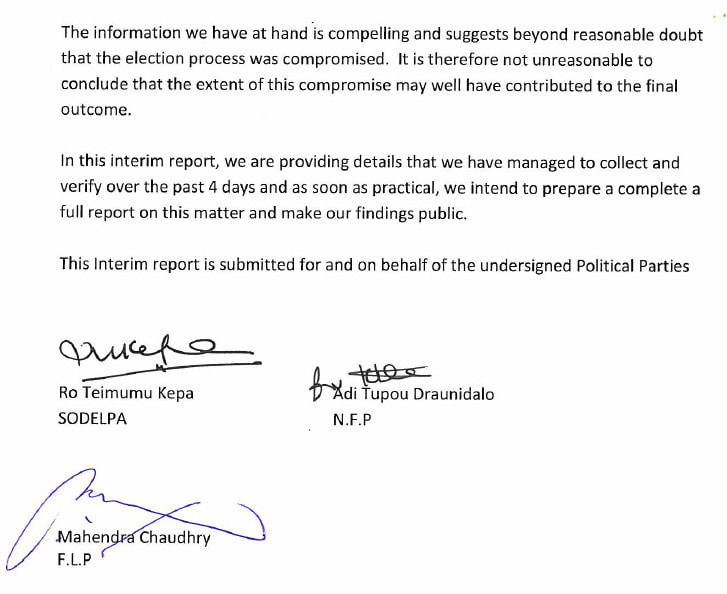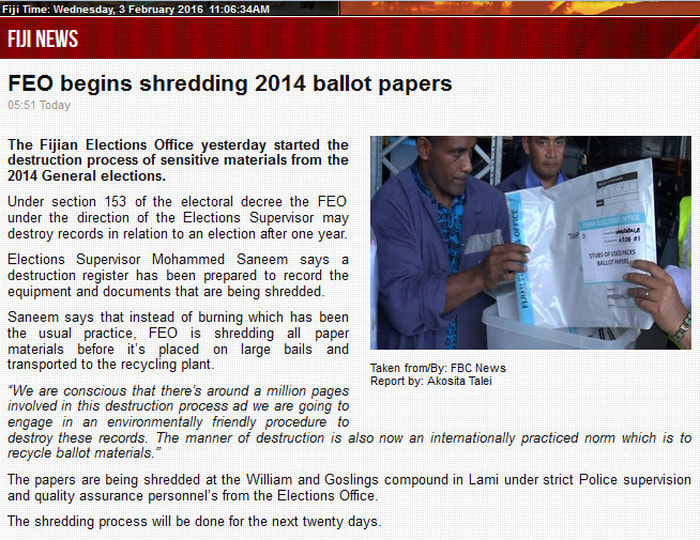From Fijileaks founding Editor-in-Chief VICTOR LAL in Nairobi, Kenya
The nine observer missions, including the European Union and the African Union, lauded the August 8 elections in Kenya as being generally free and fair. The immediate former US Secretary of State John Kerry, shortly before flying out, praised the electoral commission for having done an “extraordinary job to ensure that Kenya has free, fair and credible polls”. He then called on the opposition to “get over it and move on”. But Chief Justice David Maraga-led Supreme Court said the presidential poll was riddled with so many irregularities that it was impossible to determine who won. The Supreme Court nullified Preisdent Uhuru Kenyatta's win.
The majority ruling of the Supreme Court also indicted the Independent Electoral and Boundaries Commission (IEBC) for having “failed, neglected or refused to conduct the presidential election in a manner consistent with the dictates of the constitution and inter alia the Elections Act, Chapter 7 of the Laws of Kenya”. The judges also found that IEBC had “committed irregularities and illegalities, inter alia, in the transmission of results”, the sum of which could give rise to criminal prosecution of the staff involved
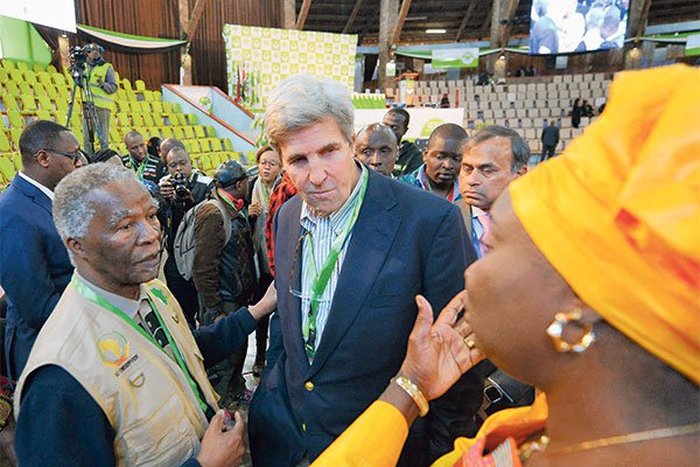
The nine observer missions, including the European Union and the African Union, lauded the August 8 elections as being generally free and fair.
However, the Justice David Maraga-led Supreme Court on Friday said the presidential poll was riddled with so many irregularities that it was impossible to determine who won.
President Uhuru Kenyatta’s lawyer Fred Ngatia cited the observer missions’ endorsement of the result as part of his defence.
Now the observers stand accused of being used to rubber stamp fraudulent elections in friendly regimes across the developing world.
PRAISED IEBC
In a pre-poll report, the US election monitoring group praised the performance of the Independent Electoral and Boundaries Commission while also pointing to commissioners’ “inadequate communication with stakeholders and insufficient transparency regarding their decision-making”.
In his remarks on behalf of the Carter Centre after the General Election, the immediate former US Secretary of State John Kerry added that there had been some “little aberrations here and there but none that we thus far feel affected the overall integrity of the process”.
Shortly before flying out, Mr Kerry praised the electoral commission for having done an “extraordinary job to ensure that Kenya has free, fair and credible polls”.
He then called on the opposition to “get over it and move on”.
DISAPPOINTED
Nasa (the National Super Alliance) presidential flagbearer Raila Odinga said he was disappointed with international observers.
In an interview with CNN two days after the election, Mr Odinga said the observers concentrated on voting and tallying but not transmission of results.
“I think they have not helped Kenyans resolve this dispute. They have confounded it by giving basically an approval to a fairly flawed process…and therefore I am very disappointed with John Kerry and the other observers,” he said.
Writing in the New York Post, Hellen Epstein, an American author and journalist who covered the August 8 elections, castigated the Carter Centre’s endorsement of the exercise.
MEDDLING
“Another rigged election in Africa is not news,” she wrote.
“But that US election observers were quick to endorse it is shocking. Perhaps they believed that wrapping the election up quickly would prevent violence,” she added, alluding to the mayhem that broke out following the disputed presidential election of 2007.
She said the way the observers, particularly the Americans, handled the elections suggested that there was a concerted effort by foreign governments to meddle in Kenyan affairs.
POLITICS
“The US Government has a disturbing history of meddling in the politics of developing countries…In countries like Kenya, where important US interests are at stake, the onslaught of mass media distortions and biased international election observers and Western-backed NGOs, suggest the possibility of concerted strategy,” Ms Epstein wrote.
And on Friday, the EU Observer Mission praised the Supreme Court ruling “since it demonstrates the independence of Kenya’s Judiciary and the effective electoral complaint mechanism in place”.
The statement said while the EU was impartial, it called on the “election administration to consult with stakeholders, to work transparently and to give regular updates on progress being made”. Source: The Daily Nation, Kenya, 3 September 2017
IT experts and scrutiny of forms may have sunk Kenya's IEBC
* IEBC provided copies that were not certified in accordance with Election Technology regulation 10 of 2017
* Chief Justice Maraga said an election must be backed up by genuine documents and a system that is transparent. He said an election is a process, not an event
* The Electoral Commission of Kenya after a tense election declared incumbent president Uhuru Kenyatta as winner of the polls
* But opposition leader and Kenyatta's main contender, Raila Odinga went to contest the outcome of the elections, insisting that the Commission's software was hacked to allow for the manipulation of the results
* Odinga and his co-petitioners maintained there were widespread irregularities in the elections that its integrity had been compromised
Failure by the electoral commission to demonstrate that the presidential election was held in a transparent and accountable manner was at the heart of the Supreme Court’s decision to void the results.
The court appears to have taken seriously reports presented to it by two teams of experts it directed to examine Independent Electoral and Boundaries Commission servers and forms 34A, 34B and 34C that were used to declare Uhuru Kenyatta the winner of the August 8 election.
The report on the servers was written by Prof Elijah Omwenga and Prof Joseph Sevilla, IT experts appointed by the court and Ms Janet Kadenyi, an employee of the Judiciary.
SERVERS
The forms scrutiny was supervised by Supreme Court registrar Esther Nyaiyaki.
The court issued a total of 18 orders to the IEBC to open itself to scrutiny.
Of these, six went to the heart of the technology that the commission deployed in the election.
Related Content The court wanted its experts and those of the petitioner, Raila Odinga, to access IEBC servers to mine some key information.
IEBC stonewalled and delayed the access for hours and when it allowed it, it was not in the manner the court ordered.
TESTS
For example, IEBC declined to provide the internal configuration firewall to its server, arguing that it will affect the security of their system.
In their report to the court, the experts disagreed, saying providing the firewall will not affect the integrity of the system.
That IEBC refused to open itself to scrutiny appears to have convinced the judges the commission had something to hide.
The court also wanted certified copies of certificates of penetration tests conducted on the IEBC election technology system.
HACKING
These are performed to test the integrity of the system and ability to withstand hacking.
IEBC provided copies that were not certified in accordance with Election Technology regulation 10 of 2017.
Again, the experts report indicts the commission and the judges followed suit.
KIEMS
The other order was on log-in trail of users and equipment into the IEBC servers and Kiems database management system.
This could have revealed information on whether there was unauthorised access to the system to change results as claimed by Nasa.
IEBC refused to provide this information.
On the forms scrutiny IEBC provided 41,451 34As, 291 34Bs and one 34C.
The scrutiny showed a number of anomalies that could have helped sway the judges decision.
They included forms that did not have security features, those that were not signed by agents and returning officers or stamped by the IEBC.
IMPUNITY
An election, Chief Justice David Maraga said, is a process, not an event.
How the winner is declared, from the tallying of the votes to their transmission, matters.
It is not random numbers announced.
They must be backed up by genuine documents and a system that is transparent, accountable and verifiable.
This was simply not the case and with the court’s ruling, Kenya is no longer just another African country where democracy is routinely subverted with impunity.
In Fiji, the 2014 election result is still contested by the Opposition, and caricatured in numerous cartoons:
From Fijileaks archive, 26 September 2014
INTERIM REPORT ON IRREGULARITIES
BY
THE MEMBERS OF THE PARTICIPATING
POLITICAL PARTIES
INCLUDING
FIJI LABOUR PARTY
NATIONAL FEDERATION PARTY
SOCIAL DEMOCRATIC LIBERAL PARTY
September 22 2014
The leaders of the joint political parties contesting the 2014 General Elections met on Thursday September 18th 2014 following representations from their respective polling agents at the count center who began comparing notes of incidents and irregularities being noticed by all party agents individually.
The polling agents at the center individually requested their Party officials to convene a meeting so that these concerns could be addressed. This resulted in a meeting taking place at 11am on September 18th 2014.
None of the Party Leaders had had previous communication on these matters and all of them were being briefed by the various polling agents directly for the first time.
Following the submissions of information and the provision of evidence, the leaders agreed that a subcommittee be formed, made up of 2 representatives from each party and they were to prepare detailed reports with specific cases and accompanying evidence and pictures where possible.
They were scheduled to make their submissions to the leaders on September 19th at 11am. This was later pushed back to 1pm because of the need for more time to complete reports and the fact that more information was being received from agents across the country.
Following the conclusion of a 6 hour briefing and discussion of the irregularities and the provision of some of the evidence, the leaders agreed to issue an updated statement and provide some of the actual evidence.
Copies of the statements and documents issued to the press were delivered to the President, the Chairman of the Electoral Commission and the Supervisor of Elections as the press was being briefed. We attach as Appendix 1 copies of the signed delivery docket for both the first and second communication.
The same delivery process occurred on the evening of the 18th September and officials of the Chairman of the Commission and Supervisor of Elections signed for their copies of the statements issued.
2. KEY OBSERVATIONS
The joint political party leadership agrees that all of the information provided to them individually and jointly by the polling agents point to a systematic and coordinated effort to alter the ballots cast at various polling stations.
This assumption, which is currently partially confirmed, stems from a number of separate occurrences which, when viewed together could be a possible explanation of how the manipulation may possibly have occurred.
3. OVERVIEW OF ELECTION CONDUCT
It is the opinion of the Leaders of the participating parties that given all of the evidence provided so far and the various signed statutory declarations by individuals who have witnessed these irregularities, that there is a case to suggest that certain aspects of the process were compromised and that depending on the extent of these irregularities, this may have a material effect on the outcome of the elections.
Given that there is still more details of irregularities coming in from around the country, it is difficult to say at this juncture if the compromised as we now know it is isolated or far more widespread.
The scenario that has emerged thus far suggests that at the close of voting, a number of polling station Presiding officers sent Polling Agents out of the room and in some cases no Police were present. The number of polling stations where this occurred in increasing as more information comes to hand.
It is likely that during this break in proceedings, which itself is a breach of Sec 89 (1) it is possible for unsecured ballot papers to be introduced into the ballot boxes so that when
thepolling agents return to the polling booth after an absence of 1 to 2 hours the count begins and they are none the wiser that anything untoward has occurred.
We do know from a number of different reports that the Presiding Officer calls the resultsthrough to a phone number given to them. They do not know who is on the other end or their name.
Information is still being received from agents and party officials around the country and each discussion ends, another piece of the jigsaw falls into place.
4. SPECIFIC DETAILS OF IRREGULARITIES
1: Complaint delivery timeframe:
The Electoral Decree requires that any irregularities that a party may become aware of must be submitted to the authorities within 2 days. Refer below
Sec 17 (2)except otherwise provided in this decree, complaints to the Electoral Commission must be submitted within 2 days of the complainant becoming aware of the decision, action or inaction.
The joint group of Political Party Leaders initially became aware of irregularities on the morning of September 18th 2014 and being mindful of the requirements of the Decree and given that not all of the facts were known at the time of the first meeting, it was decided that an interim notification to the Chairman of the Electoral Commission and Supervisor of Elections be sent to put them on notice that there were irregularities.
The group also felt obliged to keep the media informed of its actions because of the very nature of the issues involved. The first communication was dispatched to the authorities within hours of its release and the attached record of delivery show it was delivered as stated.
The 2nd communication on September 19th with some additional evidence received was dispatched the same evening it was tabled and as with the first communication the copy of the receipt of its delivery is attached.
The 3rd and final communication will be today September 22st, which will summarize examples of the information we have at hand as at Saturday 20th 2014.
The Leaders are satisfied that it has complied fully with the provisions of the Electoral Decree in terms of its delivery of information to the authorities.
Appendix 1: Copy of delivery of documentation
2. Closure of Polling Stations
We have all received information to suggest some polling stations closed for an hour and up to 2 hours. We also have information that both the Police and Agents were ushered out of the Polling Stations at the close of voting.
We are continuing with our verification of this and will establish a list of the names and total number of polling stations involved.
We are also verifying information thatin some instances polling boxes were removed from Polling stations.
As Sec 65 & 89 of the Electoral Decree clearly stipulates below, immediately after the closing of the polling stations the Presiding Officer must immediately undertake the counting.
Sec 65 closing of polls:
Immediately after the last voter who was in the queue at 6.00pm has voted, the presiding officer must announce that the polls are closed and the counting of ballot papers shall begin immediately after the close of the polls:
Sec 89 (1) Counting Process
Immediately upon closing of the polls, the counting of ballots papers is to be undertaken and completed in the respective polling station by the presiding officer and such election officials designated by him or her.
For the purposes of this report we provide a specific case to demonstrate the irregularity in question.
POLLING STATION: St John Bosco Primary School-Nadera. The Presiding Agent sent agents away for an hour.No
Police remained inside during this time. We attached a statutory declaration by the agent was involved at the polling station in question.
Other polling stations where polling agents were sent out at 6pm include:
Drasa Primary School
Raviravi Sangam School Station No 5156
Lovu Sangam School
Satya Sai School
Appendix 2: Statutory Declaration of Luseyane Ligabalavu
3: Signed Letter from Ravendra Chand Fiji Labour Party
No 3: Transmission of results
Sec 97 (1) states that ‘following the completion of the protocol of results, the presiding officer must sign it and immediately notify the ‘Supervisor of Elections’by the most expeditious method, including by telephone or any other electronic means, of the results or the total number of votes cast for each candidate, as contained in the final protocol of results.
(2) A copy of the final protocol of results must be immediately posted by the presiding officer in a publicly accessible place at the polling station, such as a notice board, another copy kept inside the ballot box and a third copy sent to the Supervisor by the most expeditious method.
(3) The original of the final protocol of results must be enclosed in a tamper free evident envelope.
Sec 102 (3) As the protocol of results are received from each polling station, in accordance with section 97 (1) or (2) the Supervisor of Elections shall progressively amend the National Results Tally to reflect the total number of votes received by that political party.
There are no other known methods of communicating the results from the polling booths to the Supervisor of Elections stipulated in the Electoral Decree, except as laid out above in Sec 97 and 102.
However, the Leaders have been made aware of the existence during the elections of a ‘Ghost Call Center’ and we now know that the Presiding Officers were instructed to call their results into a certain number and to a certain person, identified only by initials. This has been independently verified by 4 separate agents at different locations as well as a by a Polling official and a Counting Supervisor at the count Center.
None of the Presiding officers were given the name of the person they were calling, just an initial and a mobile number to call.
Likewise at the count center, we have established confirmation from a Count Supervisor that the results they were receiving ‘did not come directly from the polling venues’ but from an unknown person or persons.
Example: The example provided for this report is that from Kalokolevu to ATG, the Presiding Officers were required to call in their results to someone called R.T and not the Count Center.
This variation to Sec 95 & 102 of the process for calling in results has never made known to any of the Opposition Political Parties or their agents and at the time of this report, we cannot find any references about this amendment of the Electoral Decree being referred to by either the Chairman of the Commission or the Supervisor of Elections.
At the time of this report we can verify that a Vodafone owned by a supporter was used by a Presiding Officer to call 9993975 and give the polling results to an unknown person on the other end. The Presiding officer did not know who he was calling, except that he was given the number to call in the results too. It was not the count center.
We have also established that the number called by the Presiding Officer was one of 16 numbers listed as owned by the Elections office.
Therefore the Elections office knowingly broke the requirements of Sec 97 (1) and was operating the ‘Ghost Call Centers’ to which the results were first relayed and not the count centers.
Appendix: 4: Statutory Declaration of Polling Agent Saini Nabou of NFP
Appendix 5 Statutory Declaration of Jolame Uludole Polling Agent for SODELPA
Appendix 6 Statutory Declaration of Peter Waqavonuvonu Count Agent for SODELPA
Appendix 7 Statutory Declaration of Marika Naseqai supporter of SODELPA
No 4 Unsecured Ballots Sec 53 (6)states that during the polling process, it
is prohibited for any person, other than the Presiding officer, to remove any ballot paper from the polling station. (7) (a) and (b) outline the circumstances under which this may occur and (8) outlines the protocols to be followed.
We have the sworn statement of an agent of One Fiji who was suspicious of a parked Kia Sorrento motor vehicle No FR852, registered to Tappoos Limited, parked at the Andrews Primary School Nadi at 3pm on Wednesday September 17th.
The One Fiji official approached the parked Tappoos vehicle and noted that there were stacks of ballot papers in piles in the boot of the vehicle.
He signaled his associated still in his vehicle to take the pictures and when the individual handling the loose ballot papers saw the One Fiji official; he closed the boot and drove off.
This incident was witnessed by 2 other agents from the NFP.
Electoral Commission Response Mr. Young responded to this complaint on September 20th
As follows:
The black KIA Sorrento vehicle FR 852 is leased to the Elections office and is owned by Tappoos Limited trading as Bula Rental.
The contents in the vehicle were ‘Contracts for Polling day workers, and the vehicle was used to deliver them to the various polling stations.
The Leader’s reject the explanation given by Mr. Young on the following grounds:-
Sec 42 Presiding Officers outlines the positions to be appointed by the Supervisor of Elections from the Presiding Officer, Deputy or as outlined in Sec 42 (5)The Supervisor may appoint as many election officials as he or she considers necessary to effectively conduct an election at any polling station.
We draw the Chairman’s attention to Sec 42 (7) which clearly states and we quote A person appointed under this section must not begin to perform his or her duties unless he or she has signed a declaration or a code of conduct in the approved form.
The incident at Andrew’s Primary School took place at 3pm on September 17th, 2014, the elections ended at 6pm. So 70% of the voting may had been concluded at that time, hence the question:
i. Why was an election official delivering employment contracts to polling stations at the height of polling when 70% of the time for polling had already lapsed?
ii. Sec 42 (7) relates to all appointments by the Supervisor and therefore if Mr Young’s explanation is to considered, then hundreds of election officials were performing their tasks in breach of Sec 42 (7).
iii. Mr. Young dismisses our witnesses account as false and says the documents were day worker contracts? We put it to Mr. Young that we are not mistaken and that our witness knows the difference in size between an A4 paper and the 2014 ballot paper and it would not be too difficult to measure the size of the documents in the picture to determine if they were ballots or A4 size contract letters.
iv. We submit a photo below (Photo A) of the actual ballot paper verses the A4 size that by convention offices use for administrative matters such as letters and contracts. There is a significant difference in size. Unless the Elections office uses paper the same size as the ballots for your normal administration work, Mr. Young may care to display these for verification.
v. Given the Chairman’s remarks about the vehicle and its mission, we would ask him to make public the following information:
a. How many day workers were engaged by the Elections office on Polling and pre polling duties?
b. How many of them were performing their duties in breach of Sec 42 (7) during this time.
c. Please show the public copies of your day contracts against a ballot paper size.
d. Why was the election official in the photo not in uniform?
e. How many polling stations and contracts did he deliver that day?
f. How many other polling stations around Fiji required contracts to be delivered after polling was almost over?
g. How many other cars and election officials were engaged in a similar way on election day
Appendix 8 Statutory Declaration of Pauliasi Rokosawa Balawa Fiji One Party
No 5: Unsecured Ballots II a second sighting of an unsecured ballot paper was made
On Thursday 18th September 2014 at the Nasinu Forestry Station room. The ballot was discovered the day after counting had been concluded.
The ballot paper was a vote for candidate 255 a photo of the original ballot paper in question is shown below:
With sightings of unsecured ballot papers in the West and East this gives rise to the question of how many other areas are involved?
Photo A: Photo B:
Comparison A4 paper verses ballot paper Copy of ballot for Candidate # 255
Appendix 9 Statutory Declaration of Peniasi Daveta of Sabeto
Pre Polling Agents from SODELPA & NFP noted discrepancies in some of the Pre-Polling containers as they were off loaded on September 17th at 3pm in the Vodafone Arena in Suva.
The number of ballot boxes involved was as follows:-
Ba-Tavua-Rakiraki 73 Lautoka 42
Keiyasi 38 Eastern 155
Northern 124Navua 44
Nausori14Korovou19
Vunidawa 40Suva 0
Total 549
The Suva container was opened after protest from the polling agent and there were no ballot boxes inside.
All ballot boxes had additional documentation and files and other objects inside them, suggesting that they would have had to have been opened in order to place them inside the box.
Appendix 10 Statutory Declaration of Peter Waqavonuvonu of SODELPA
6. COUNTING IRREGULARITIES
We attach a summary of the counting irregularities that we have encountered and we have included our responses to the comments made by Chairman Young on some of the irregularities raised.
Reports continue to flow in from around the country and we continue to assess and reconcile the information so that we only deal with those issues that can be verified and which we believe are important to be included.
We will continue with this process until we have got details in from all over the country.
Appendix 11 Documentation of irregularities
7. CONCLUDING REMARKS
The leaders of the political party’s believe that the information submitted to them by the polling agents and other party officials around the country suggests that the electoral process undertaken in 2014 was compromised.
The extent of the compromise will only be known once more details become available and more people step forward to verify the breaches of the Electoral Decree and other laws and regulations pertaining to the conduct of the 2014 elections.
At 6pm on Monday 22nd September our team at Natovi witnessed the arrival of one truck full of ballot boxes from the North and Election official NG confirmed another 5 were due in the next day. Yet the Supervisor of Elections and the Electoral Commission have both proceeded to call the result.
The information we have at hand is compelling and suggests beyond reasonable doubt that the election process was compromised. It is therefore not unreasonable to conclude that the extent of this compromise may well have contributed to the final outcome.
In this interim report, we are providing details that we have managed to collect and verify over the past 4 days and as soon as practical, we intend to prepare a complete a full report on this matter and make our findings public.
This Interim report is submitted for and on behalf of the undersigned Political Parties.
According to Kenyan political and legal commentators the following issues may have swayed the Kenyan Supreme Court, mostly from failed IEBC systems and processes.
* First, failure to use standardized forms 34A, 34B and form 34C- serialized and bar coded forms.
* Second, the electoral commission’s failure to have the forms executed correctly;
missing signatures of agents and returning officers on Forms 34A and B.
* Failure to ensure full participation of party agents.
* Failure by IEBC to validate electronic with raw data.
* Failure by IEBC to fully comply with court orders in the access of servers and election KITs raised suspicions.
* The use of technology experts also helped shed more light on what happened behind IEBC closed doors during the tallying.
* The court has, however, made it clear that President Uhuru Kenyatta did not do anything wrong, the voters did their part but IEBC is the main culprit who allowed the horse to bolt - whether this was done deliberately or out of incompetence remains to be seen.
Passing Note: Our founding Editor-in-Chief VICTOR LAL is completing a book length manuscript on the trial and imprisonment of the current President Uhuru Kenyatta's father, the late Jomo Kenyatta, the founding father of modern Kenya, and also on the role of the late Jaramogi Oginga Odinga, the father of the current presidential challenger Raila Odinga. Both Jomo Kenyatta (a Kikuyu) and Jaramogi Odinga (a Luo) were allies in the struggle for Kenya's independence from British colonial rule. Jomo Kenyatta became Kenya's first President and Jaramogi Odinga became Vice-President respectively, and then the two became adversaries. Now, Uhuru Kenyatta and Raila Odinga are locked in rivalry, extending the family quarrels in Kenyan politics
